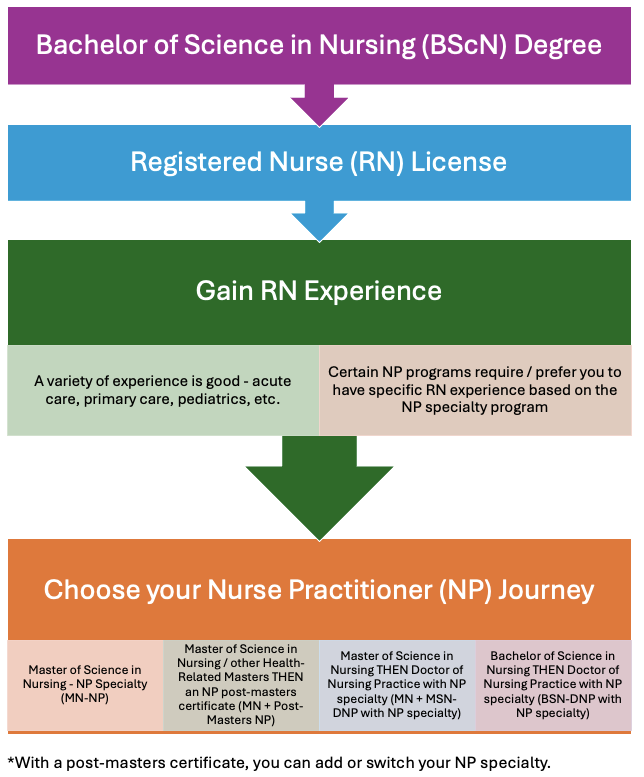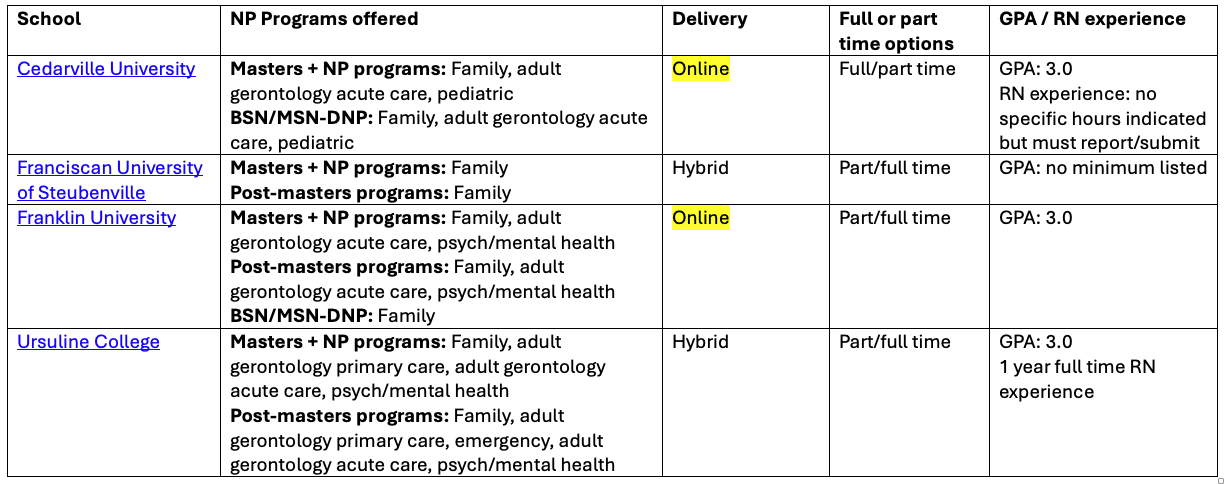Nurse Practitioner/APRN Programs in Ohio
The path to becoming a nurse practitioner will be unique to you. For those of you thinking of pursing a career as an NP, I hope to provide some guidance. If you want a general overview on how to become an NP in the U.S., I suggest you read this post. If you plan on pursuing an NP career in Ohio, then read on!
First, let’s define some terms:
BSN: bachelor's of nursing science (undergraduate degree)
MSN: masters of nursing science (masters graduate degree)
MN-NP: combined maters + nurse practitioner degree (masters graduate degree)
DNP: doctor of nursing science (some schools offer with an NP specialty) (doctoral graduate degree)
Post-masters certification: an additional certification (like an NP speciality) someone gets after completing a masters of nursing degree
Recap: How to Become a Nurse Practitioner (NP) in the US
If you’re thinking of becoming an NP, I highly recommend this read to get you prepared.
You can also join the NP reasoning community to get your NP learning kick-started - LEARN MORE.
What Nurse Practitioner Programs are offered in Ohio
There are 4 common streams:
Master of Science in Nursing with an NP specialty (MN-NP)
Post-masters NP
Bachelor of Science in Nursing to Doctor of Nursing Practice (BSN-DNP) with an NP specialty
Masters of Science in Nursing to Doctor of Nursing Practice (MSN-DNP) with an NP specialty
Let’s break these down:
MN-NP programs: these are for students who do not have a master’s degree in nursing. Courses are a blend of masters & NP courses, to prepare you to become an NP.
Post-masters programs: you require a master’s degree in nursing to apply for a post-masters program. Programs focus on core NP courses to prepare you to become an NP.
BSN-DNP with an NP specialty: This is an advanced, doctoral-level nursing program for Registered Nurses (RNs) with a Bachelor of Science in Nursing (BSN) who want to become a specialized Nurse Practitioner (NP). These programs are typically longer e.g. 3-4 years.
MSN-DNP with an NP specialty: This is an advanced, doctoral-level nursing program for Registered Nurses (RNs) with a Master of Science in Nursing (MSN) who want to become a specialized Nurse Practitioner (NP). These programs are typically longer e.g. 3-4 years.
When applying to a nurse practitioner program, you’ll need to choose a specific specialty to focus on. Many programs also require applicants to have prior RN experience. For instance, if you’re interested in adult-gerontology acute care, most schools expect 1–2 years of RN experience in an acute care setting, such as the ICU. Here is an overview of NP specialties to choose from.
Common Nurse Practitioner (NP) Specialties in Ohio:
Want to kick-start your NP journey? NP Reasoning curates the top guideline updates, clinical approaches & diagnostic pearls to help you make confident decisions with your patients.
Sign me up!
Nurse Practitioner (NP) Schools in Ohio
There are LOTS - here is a quick snapshot of all the programs offered by University:
If you want to check out a document I compiled with up to date information on each program + links to each program embedded click the button below:
Online Nurse Practitioner (NP) Programs in Ohio
Several universities offers online NP programs which allows for flexible learning. Several highlight the need for a few on-campus “intensives.” Intensives are hands-on workshops that bridge the gap between theoretical knowledge and practical application. These immersions are held at the university's physical location, are guided by expert faculty, and focus on refining advanced clinical skills in a supportive, collaborative environment, reinforcing the university's commitment to career-ready graduates.
Ohio State University: masters-NP programs, DNP programs (acute care pediatrics, family, adult gerontology acute care, neonatal, psych/mental health)
University of Cincinnati: masters-NP programs (adult gerontology primary care, family, nurse-midwifery, women’s health, and post-masters certificate programs (family, psych/mental health)
Western Governors University: masters-NP programs and post-masters certificate programs (family, psych/mental health)
Ohio University: masters-NP programs, post-masters certificate programs, and DNP programs (adult geriatric acute care, family, psych/mental health)
Cleveland State University: masters-NP programs, post-masters certificate programs (Family, psych/mental health)
University of Toledo: DNP programs (family, psych/mental health)
Wright State University: masters-NP programs (Family, psych/mental health, adult gerontology acute care, neonatal, pediatric acute care, pediatric primary care), post-masters certificate programs (Family, pediatric acute care, pediatric primary care)
Youngstown State University: masters-NP and post-masters certificate programs (Family, adult gerontology acute care)
Cedarville University: masters-NP and post-masters certificate programs (Family, adult gerontology acute care, pediatric)
Franklin University: masters-NP and post-masters certificate programs (Family, adult gerontology acute care, psych/mental health), DNP program (family)
Nurse Practitioner (NP) Program Pre-Requisites in Ohio
Most schools in Ohio require the following pre-requisites:
A minimum GPA of 3.0 * some schools require a higher GPA - refer to the table above.
RN experience: 1-2 years (some do not specify number of hours); many programs require specific RN experience depending on the speciality you are applying to - especially acute care specialties.
BScN: for masters programs or BSN-DNP programs
MSN: for post-certificate/post-masters programs or MSN-DNP programs
Other: many require an undergraduate statistics course with a minimum grade average of B/C, and other courses (e.g. undergraduate research course)
For admission, most NP programs in Ohio require you to have a BScN degree, RN registration, a GPA of 3.0, and many prefer a minimum of 1-2 years related RN experience.
Can I work while I’m completing the NP program?
This depends on many factors. One should weigh personal responsibilities, work-life balance, completing the program full-time versus part-time. In general, it’s possible to work while enrolled in the program, but this is up to your comfort level. Personally, I completed a full-time post-masters NP certificate and did not work. The course content, paired with clinical rotations were very intensive, and I was able to immerse myself in the program and get the most out of it. That being said, circumstances differ, and you need to do what works best for you. It’s important to highlight that regardless of the program, it is a steep learning curve and lots of the learning is self directed. If you are seriously considering this next step in your career, our post on how to prepare for NP school will be helpful.
Where can I work as a Nurse Practitioner in Ohio?
✅ Primary Care Clinics – Family practice, internal medicine, pediatrics, and women’s health.
✅ Hospitals & Acute Care – Emergency departments, ICUs, inpatient units, and specialty care.
✅ Specialty Practices – Cardiology, dermatology, oncology, orthopedics, mental health, and more.
✅ Urgent Care & Retail Clinics – Providing fast access to same-day care.
✅ Long-Term Care & Rehabilitation – Nursing homes, assisted living facilities, and rehab centers.
✅ Schools & Universities – Student health services and wellness programs.
✅ Public Health & Community Clinics – Serving underserved and rural populations.
✅ Telehealth & Private Practice – Growing opportunities for independent or group NP practices.
Ohio NP Scope of Practice (Reduced Practice State)
Ohio is classified as a “reduced practice” state for nurse practitioners.
NPs must enter into a Standard Care Arrangement (SCA) with a collaborating physician. The agreement defines the services the NP may provide, prescribing parameters, and review frequency.
The collaborating physician does not need to be onsite; oversight is more administrative than direct.
The SCA must be reviewed and renewed annually.
NPs in Ohio have prescriptive authority, including for Schedule II–V controlled substances under defined limits (e.g. a 7-day supply for Schedule II) and must register with the state’s prescription monitoring program (OARRS).
Must complete a minimum 45 contact-hour advanced pharmacology course (within 5 years) as part of licensure.
Recent legislative efforts (e.g. HB 726) aim to expand NP autonomy and allow independent practice (i.e., without mandatory collaboration), though as of now, collaboration is still required.
NPs are allowed to perform many non-physician tasks—sign handicap permits, sign certain work comp documents—but are not permitted to sign death certificates.
Failure to adhere to the SCA or prescribing rules may lead to disciplinary actions via the Ohio Board of Nursing.
Key Take home Points:
Do your research on NP programs.
Don’t hesitate to reach out to university admissions offices to ask questions about the program or admission process.
Talk with nurse practitioners who have been through this process already.
Think about what you want out of your career (Do you want a serious challenge with career growth potential?)
The NP program (and career in general!) is intense and will probably be the steepest learning curve of your life. Don’t let this intimidate you – check out our newsletter to kick-start your NP journey.
Join NP Reasoning Masterclass for a practical, curated educational experience for the busy NP.
Disclaimer - The views expressed in this post are my own and do not represent the official position of any organization. This is not a sponsored post.
Related Posts
How Do I Become a Nurse Practitioner in Canada?
How Do I Become a Nurse Practitioner In the U.S.?
How Do I Become a Nurse Practitioner: Getting my License?
How Do I Study for my Nurse Practitioner Certification Exam?
Should I Become a Nurse Practitioner?







